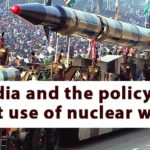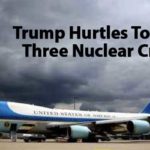Now that the US President Donald Trump has accepted the invite from Kim Jong Un, the supreme leader of North Korea, to meet in near future, maybe in coming May, in order to defuse the ongoing Korean crisis, the traction for such insane call as is reproduced below is expected to be significantly dipping, at least till the meeting takes place.
Not that such voices will get completely muted, these may even be considered useful to maintain the “pressure”. But the call, by no means unique, is rather “useful” also in an altogether different way.
It offers a revealing peek into the diseased mindset, dressed up as sophisticated logic, of the war lobby completely unconcerned about the value of human life and the disastrous consequences with colossal loss of human lives that’d surely follow if such prescriptions are actually acted upon.
In fact, voicing of such demands only heightens the probability of the unthinkable actually happening. That the subject author is a retired Vice Admiral of the US Navy and former Director of the Defense Nuclear Agency (DNA), under the US Department of Defense, which would since be renamed as Defense Special Weapons Agency (DSWA) to subsequently further evolve into the Defense Threat Reduction Agency (DTRA), needs be duly noted.
An awareness would hopefully help the peace movements to draw up and make appropriate countermoves.
The facts are clear. Here is the path the world’s nuclear weapons are on today.
There are eight nuclear weapons states. Two others are close.
North Korea is within months of having effective, high-yield thermonuclear weapons and intercontinental ballistic missiles for their delivery.
Diplomacy, sanctions, and international pressure will never cause North Korea to give up these capabilities.
North Korea is probably already capable of targeting other Asian nations with nuclear weapons, and will soon be able to strike the U.S.
The world — having permitted this irresponsible and belligerent rogue state to go into production of deliverable nuclear weapons — will never be able to deny then to any state. Nonproliferation is dead.
North Korea is going into production of nuclear weapons and intercontinental ballistic missiles, for sale to aggressor states and terrorists. These sales will probably be enough to lead to the destruction of several cities each year.
Within a few years, Iran will also be producing enough nukes per year to enable Hezbollah, Hamas, the Houthis, and others to destroy a similar number of cities per year.
It is already becoming clear to the world that the only safety factor a state can have is possession of ready nukes. By 2030, enough technologically advanced states (Japan, South Korea, Taiwan, Saudi Arabia, Egypt, Turkey, Germany, Australia, etc.) will have brought the total number of nuclear weapons states to about twenty.
By 2040, the number will have increased to about thirty as nations which formerly relied upon the U.S. nuclear umbrella for protection realize that we cannot cover everyone.
By mid-century the world’s count of nuclear weapons states will be about forty, as the most-advanced third-world states will have parlayed the reactor technology they’re building today into nuclear weapons.
But this is only the beginning. Proliferation will continue apace. Nuclear weapons will be everywhere, uncounted, unprotected. They will be readily available for acquisition by failed states, failing states, states undergoing civil wars, criminals, extortionists, and disaffected individuals. Nuclear weapons will be as available as assault weapons and high explosives are today.
Our world will have become one of nuclear horror and chaos. The globe will be dotted by the radioactive ruins of deserted cities, large and small. And there is no way back.
Today’s path leads directly to this result.
Do we have any alternative? Absolutely! But only one.
The U.S. must use conventional military force to dismantle — totally — North Korea’s nuclear weapons capability. After giving a final ultimatum, strike immediately and hard. Disable all electric power. Disable all possible communications systems. Demolish all leadership sites. Demolish all known nuclear and missile facilities. Assist South Korea in countering the missiles and artillery targeting Seoul, and in ensuring that the capital’s population is saved. Increase the tempo, day after day. Be alert for negotiations, but total nuclear dismantlement is non-negotiable.
When North Korea is resolved, the whole world will feel an immense surge of hope. Maybe nonproliferation can be saved.
Next tackle Iran, another rogue state, and the world’s top supporter of terrorism. Same demand: total nuclear dismantlement, with permanent, intrusive, international verification. Same limitation to conventional force. When Iran declines, demolish the Natanz uranium enrichment facility as an early element in the negotiation process. Attempt to achieve nuclear dismantlement with more carrot than stick, but get thee job done.
America will have done the impossible. The world is back to eight nuclear weapons states, with no readily apparent proliferators. Now the job is to keep it that way, remembering the lesson so painfully just learned: nonproliferation requires enforcement.
This calls for another American miracle. We must launch a decades-long diplomatic crusade to convince the world that it is possible to live comfortably with nuclear weapons.
We do this by starting with the landmark Nonproliferation Treaty (NPT) of 1970. Its creators had the wisdom to base the entire treaty on a two-tier structure of nations: five approved nuclear weapons states (permanent members of the United Nations Security Council), with the remainder (currently 185) signing as non-nuclear weapons states. The obvious step that must be taken now is to empower these five — individually or collectively — with the responsibility for enforcing nonproliferation on behalf of the U.N., using conventional military force, if necessary.
Two treaty adjustments (formal or informal) will be required. The five must be given this authority under the NPT, and the Comprehensive Test Ban Treaty must not apply to the five (so their enforcement capability can never be questioned).
Will the five be willing to accept this responsibility? Only time will tell, but it seems the best alternative. Will the rest of the world agree? Not at first, but what a challenge for U.S. diplomacy.
The world can be saved, but only if America has the courage to act immediately to enforce nonproliferation, and then commits to the sustained diplomatic leadership necessary to make nonproliferation permanent.
Robert R. Monroe, vice admiral, U.S. Navy (Ret.), is former director of the Defense Nuclear Agency.


